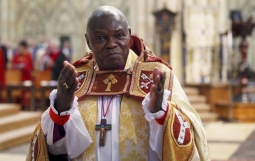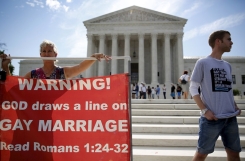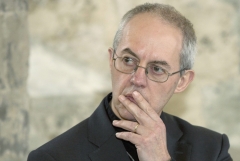The US Episcopal Church changed its law to allow clergy to perform same-sex marriages last night, not pulling back from the move despite the "deep concern" expressed by the Archbishop of Canterbury.
Delegates at TEC's general convention in Salt Lake City, Utah voted overwhelmingly in favour of amending canon law so that instead of marriage being defined as between "a man and a woman" or "husband and wife", it is now gender-neutral and between a "couple".
It came days after the US Supreme Court legalised gay marriage across the nation and shortly after Archbishop of Canterbury Justin Welby spoke up about the "stress" such a move would exert on the worldwide Anglican Communion.
As "primus inter pares" or first among equals of the communion's Archbishops, Cantuar has spiritual authority only and no juridical authority over provinces outside his own. Previously, TEC ignored an even stronger warning from Archbishop Welby's predecessor Dr Rowan Williams when it moved towards the consecration of the gay and partnered Gene Robinson as a bishop in 2003.
The vote in the House of Deputies, the clergy and lay delegates, came the day after the House of Bishops approved the change by a 129-26 majority with five abstentions. Many dioceses in fact already permit its clergy to carry out same-sex marriages, unlike in the Church of England, where bishops secured Parliamentary protection from ever having to take such a step.
Clergy in TEC, which has nearly two million members, remain free however to opt out from performing the ceremonies.
The Very Rev Brian Baker, chairman of the committee that drew up the legislation, said:
"We have learned to not only care for, but care about one other. That mutual care was present in the conversations we had. Some people disagreed, some people disagreed deeply, but we prayed and we listened and we came up with compromises that we believe make room and leave no one behind."
Rev Susan Russell, a long-time campaigner on the issue, from Los Angeles, said: "In 1976, the Church promised full and equal claim to LGBT members, and we've spent those years making that resolution a reality. Today's action is a huge step towards a promised land of a Church that fully includes all its members."
The conservative website Stand Firm in Faith published a list of the bishops who abstained and voted no, and commentors posted comparisons with those who voted against consent for Bishop Robinson's election as Bishop of New Hampshire in 2003.
One of the conservatives, Bishop Daniel Martins, of Springfield, Illinois, wrote on his blog (http://cariocaconfessions.blogspot.co.uk/2015/06/the-fifth-legislative-day.html) that he can and will prohibit the use of the new rites in his diocese, although he will be legally obliged to make them available on request.
He wrote: "Nonetheless, the Episcopal Church has, today, effectively redefined marriage - a universal and timeless human social institution that Christians have believed is, in fact, not merely a human social institution, but a gift from God that is literally prehistoric, participating in the order of creation. We have done so, moreover, without even a pretense of consultation with the other provinces of the Anglican Communion, to say nothing of the rest of the Christian world. It is an act of breathtaking hubris, an abuse of common sense truly worthy of the descriptor Orwellian."
















